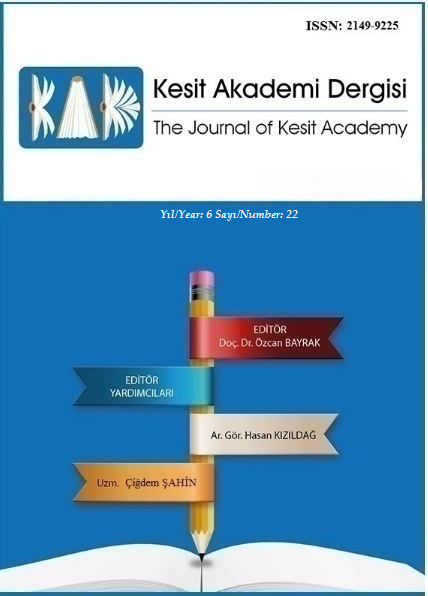Author :
Abstract
Toplumların sosyokültürel yapılarını yansıtmada atasözleri önemli bir yere sahiptir. Tarih sahnesinde yer almış, özellikle köklü bir geçmişe sahip milletlerin hayat tarzlarının ve anlayışlarının atasözlerine farklı biçimlerde yansıdığı görülmektedir. Milletlerin uzun tarihleri boyunca karşılaştıkları olaylar neticesinde elde ettikleri tecrübelerin uzun gözlemlerden sonra etkili ve özlü bir biçimde sonraki kuşaklara aktarılması ile ortaya çıkan atasözleri yıllar yılı sözlü gelenek içinde yaşasa da yazılı metinlerde de kullanılmış olan birçok atasözü bulunmaktadır. Bu metinlerden birisi de Kaşgârlı Mahmud’un birçok Türk boyunu oba oba gezip o boylarda yaşayan sözlü gelenek ürünlerini 11. yüzyılda yazıya geçirdiği Dîvânu Lugâti’t-Türk eseridir. Farklı birçok Türk boyuna ait yüzlerce atasözüne yer verilen ve Türkçenin en önemli kaynaklarından biri olan bu eserde bugün Özbek Türkçesinde kullanılan atasözlerine de yer verilmiştir. Bu çalışmanın amacı, Dîvânu Lugâti’t-Türk’teki atasözlerinden hangilerinin bugün Özbek Türkçesinde de kullanıldığını tespit etmek ve bu atasözlerindeki anlam özelliklerinin değişime uğrayıp uğramadığını incelemektir. Bu bağlamda, Orta Asya’da yaygın bir konuşma alanı bulunan Özbek Türkçesi atasözlerinde, Dîvânu Lugâti’t-Türk ile aynı anlam özelliklerini devam ettiren birçok atasözünün olduğu görülür.
Keywords
Abstract
Proverbs have a crucial place in reflecting the sociocultural patterns of societies. It is figured out the fact that the lifestyle and understanding of nations which took place on the scene of history with their ancient history are reflected to proverbs in shape of different ways. Even though there are oral proverbs which emerged as a result of transferring the experiences gained as a result of the events faced by the nations during their long history to the next generations after long observations, there are many proverbs that have been used in written texts as well. One of these texts is the Dîvânu Lugâti't-Turk work in which Kasgârlı Mahmud traveled across many Turkish tribes, and wrote the oral tradition products living in those tribes in the 11th century. In this work, which includes hundreds of proverbs belonging to many different Turkish tribes and is one of the most important sources of Turkish language, proverbs used in today’s Uzbek Turkish are also included. The objective of this study is to determine which proverbs in Dîvânu Lugâti't-Türk are used in Uzbek Turkish today and to examine whether the semantic of these proverbs have changed. In this sense, it is observed that many of Uzbek Turkish proverbs, which havśe a widespread conversation zone in Central Asia, are faced with the same semantic as in Dîvânu Lugâti't-Türk ones.
Keywords
- Akar, A. (2017). Türk Dili Tarihi. İstanbul: Ötüken Yayınları.
- Aksoy, Ö. A. (2017). Atasözleri ve Deyimler Sözlüğü. İstanbul: İnkılap Kitabevi Yayın Sanayi ve Ticaret AŞ.
- Albayrak, N. (2009). Türkiye Türkçesinde Atasözleri. İstanbul: Kapı Yayınları.
- Atalay, B. (2018). Divanü Lûgat-it Türk (Çeviri-Dizin). Ankara: Türk Dil Kurumu Yayınları.
- Bulut, S. (2016). Divânü Lügâti't-Türk'ten Ahıska Türkleri Yazılı ve Sözlü Diline Geçen Atasözleri. Journal of Turkish Language and Literature (Litteraturca), 95-112.
- Ercilasun, A. B. (2007). Türk Lehçeleri Grameri. Ankara: Akçağ Yayınları.
- Ercilasun, A. B. (2016). Türk Dili Tarihi. Ankara: Akçağ Yayınları.
- Ercilasun, A. B., ve AKKOYUNLU, Z. (2018). Dîvânu Lugâti’t-Türk. Ankara: Türk Dil Kurumu Yayınları.
- Gültekin, M. (Nisan 2013). Özbek Atasözlerinin Cümle Yapısı Üzerine Bir İnceleme. The Journal of Academic Social Science Studies, 483-500.
- Günşen, A. (2006). Dîvânu Lûgati't-Türk'teki Savların Cümle Yapısı. I. Uluslararası Türk Dünyası Kurultayı. 3, s. 1041-1054. Ankara: Ege Üniversitesi Türk Dünyası Araştırmaları Enstitüsü Yayınları.
- Kurumu, T. D. (1998). Türkçe Sözlük. Ankara: Türk Dil Kurumu Yayınları.
- Kurumu, T. D. (2009). Bölge Ağızlarında Atasözleri ve Deyimler I-II. (Ö. A. AKSOY, C. DİLÇİN, K. ACARLAR, M. TOLLUOĞLU, P. KUTLAR, Y. PÜSKÜLLÜOĞLU, ve N. ŞENER, Dü) Ankara: Türk Dil Kurumu Yayınları.
- Odunkıran, F. (2015). Dr. Emek Üşenmez'in Modern Özbek Türkçesi Adlı Eseri Üzerine. Uluslararası Türkçe Edebiyat Kültür Eğitim Dergisi (TEKE) , 1782-1785.
- Oy, A. (1972). Tarih Boyunca Türk Atasözleri. İstanbul: Türkiye İş Bankası Kültür Yayınları.
- Yoldaşev, İ., ve GÜMÜŞ, M. (1995). Özbek Atasözleri. Ankara: Engin Yayınevi.
- Yusupova, N. (2018). Türkçe-Özbekçe Sözlük. Ankara: Türk Dil Kurumu Yayınları.





